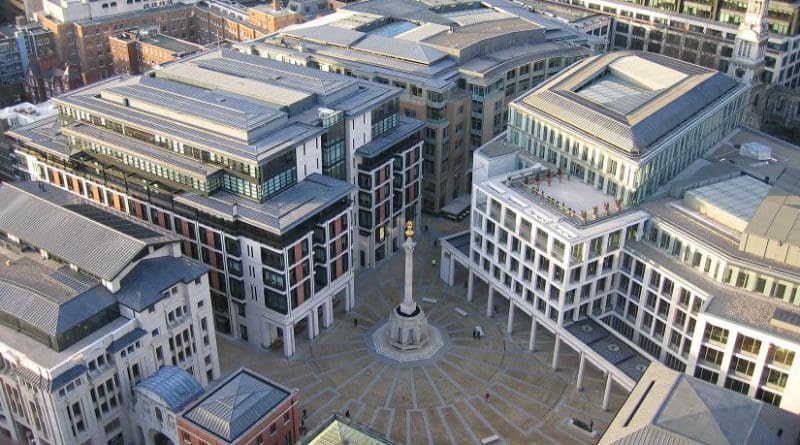London Steals New York’s Thunder With Saudi Markets Upgrade
By Arab News
By Frank Kane*
Saudi Arabia went to New York in a bid to woo American investors to its ambitious plans to transform the Kingdom’s economy away from oil dependency, but it was London that stole the show with a shrewdly timed announcement and a flying visit by the head of the London Stock Exchange.
Crown Prince Mohammed bin Salman met Mark Makepeace, head of the LSE, as the exchange’s index compiler FTSE Russell announced it had given approval for the Riyadh stock exchange, the Tadawul, to be granted emerging market status from early next year.
The move puts Saudi Arabia in a select club of markets that includes China, Russia and India, and will cement its position as the leading stock market in the Middle East. The Kingdom will comprise 2.7 percent of the index, which is part of FTSE Russell’s global emerging markets indices.
It was given “secondary” market status, but — with the pace of financial market reform accelerating in the Kingdom — it is only a matter of time before “advanced” status is accorded to Tadawul, once certain other regulations have been put in place. Tadawul has moved at such speed in the past two years that this is unlikely to take long.
The move will mean an instant uptick of around $5 billion (SR18.75 billion) from passive funds seeking to invest in the Kingdom’s Vision 2030 transformation. Most of the world’s big pension funds, until now prevented by their own regulations, will be able to entrust pensioners’, widows’ and orphans’ funds into Saudi Arabian securities. It is a huge shift in global investor sentiment.
The implications for regional capital markets are also profound. At a capitalization of $500 billion, the Riyadh exchange is already the largest in the Middle East, and the move announced in New York will entrench that position. Tadawul authorities have already indicated they want to make it the “dominant” exchange in the Arabian Gulf, and this will happen faster now.
Discussions with other regional exchanges, especially in Bahrain and the UAE, on further regulatory cooperation and possible dual listings of stocks are likely to pick up urgency.
When the other big index compiler MSCI admits Riyadh to its own emerging markets index in June — which has been widely flagged and now must be a formality — it will complete the transformation of Riyadh’s financial markets. Once big but closed, they will now be even bigger and open to foreign investment on a scale that would have been unthinkable just a few years ago.
Those foreign investors will be able to take part in the biggest privatization program in history, with as much as $300 billion of assets set to be sold off by the government. A large portion of this will be in the from of initial public offerings (IPOs) on the stock exchange. Foreigners will be able to buy into Saudi Arabia’s energy infrastructure, schools and hospitals, booming entertainment and tourism business, and even its football clubs.
They will also be able to take part directly and more easily in the “big one” — the IPO of Saudi Aramco, valued at $2 trillion. This will definitely take place on the Tadawul, in addition to foreign exchanges being considered. Aramco executives are insistent it is on track to happen later this year.
With the new classification, Aramco on Tadawul can attract serious institutional investment from abroad — perhaps not enough to take on the whole of the $100 billion valuation a 5 percent IPO would involve, but a bigger chunk of it than before. Fears that the Saudi market might be swamped by Aramco shares would be assuaged if the biggest pension funds in the world are also participating in Riyadh.
The more interesting question is whether the FTSE coup in New York makes it more likely that Aramco will chose London as the venue for the international part of the transaction.
Certainly the timing was cheeky on London’s part. The Saudis had spent all week in the city meeting American investors, and must have also had meetings with the New York Stock Exchange and Nasdaq. There were plenty of US financial institutions represented at the Saudi-US CEO Forum the day before the FTSE announcement.
It must have been galling for those eager institutions that a Manhattan judge chose the same day as the FTSE announcement to rule that law suits under the Justice Against Sponsors of Terrorism Act (Jasta) could proceed, rejecting Saudi claims the cases should be dismissed.
This is one of the things Aramco advisers had said was acting against New York’s efforts to win the foreign part of the IPO. But the American justice system is long and convoluted, and that particular ruling will be challenged again, with the help of the finest legal experts money can buy.
The choice of venue still has to be decided, but the FTSE coup has made Saudi Arabia, and Aramco, eminently more investible propositions.
- Frank Kane is an award-winning business journalist based in Dubai. He can be reached on Twitter @frankkanedubai

